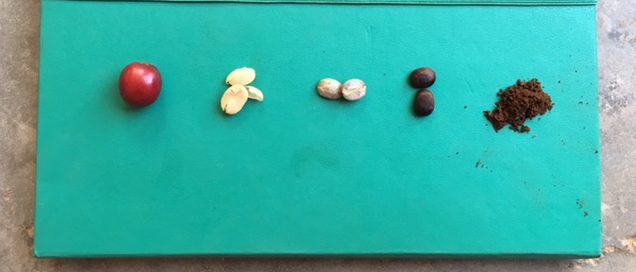
This January, first-year Bard CEP students went to Oaxaca, Mexico for a course examining resource management, sustainable development and international trade dynamics. The activities of the trip highlighted how community dynamics and global economic drivers influence resource management and the sustainability of development.
One approach to sustainable development that I find fascinating is the inclusion of smallholder producers in the global economy through supply chains. While there are many challenges to this particular approach, it seems to be an inevitable consequence of globalization. The local and global economy, environmental sustainability and social equity are all intertwined in this approach.
Chocosol Traders and the Shortened Supply Chain
Many supply chain initiatives aim to benefit participants at every level fairly, while maintaining environmental integrity and economic competitiveness. Some manufacturers, for instance, address supply chain inequities by developing direct relationships with their producers, metaphorically shortening the supply chain.
While in Oaxaca, we met with one such manufacturer, Chocosol Traders, an Ontario-based chocolate manufacturer (although the company was originally founded in Oaxaca) that works directly with the producers of their raw materials. We learned from their Oaxaca-based buyer about Chocosol’s efforts to maintain a mutually beneficial trade relationship while also improving the natural ecosystem. For example, Chocosol offers workshops for their producer farmers to learn efficient and sustainable agricultural techniques. Additionally, they encourage their producers to diversify their planting to provide economic resilience as well as ecosystem services through forest farming. These efforts should benefit both Chocosol and the producer communities–as well as the natural system.
The Producer Perspective

Interestingly, later in our trip, we visited Chocosol’s coffee producer in Tierra Blanca. We met with the farmer collective and were able to see their organic and sustainable farming practices first hand. We learned how the farm worked from a local NGO, Mbis Bin, which told us about the practices the collective uses to conserve resources (and thus input costs) and maintain the health of its land.
It was fascinating to interact with representatives from both ends of the conceptual supply chain and understand the concerns for both parties. Notably, it was explicit that price is the determining factor when the producers are deciding to whom to sell their crop. Chocosol offers a highly competitive price, reportedly above the global market price. Perhaps over time, a mutual loyalty can be built into the producer-buyer relationship through services and dependability, ultimately rendering price just one of many deciding factors.
The visits to Chocosol and Tierra Blanca were a small portion of what we experienced during our two-week trip. As we settle back into the semester, studying food systems through the lens of agroecology and climate change, economics and policy solutions, I find myself still learning from our interactions. A major driver in my decision to pick Bard was the interdisciplinary approach to problem solving, which the trip to Oaxaca illustrated beautifully.

